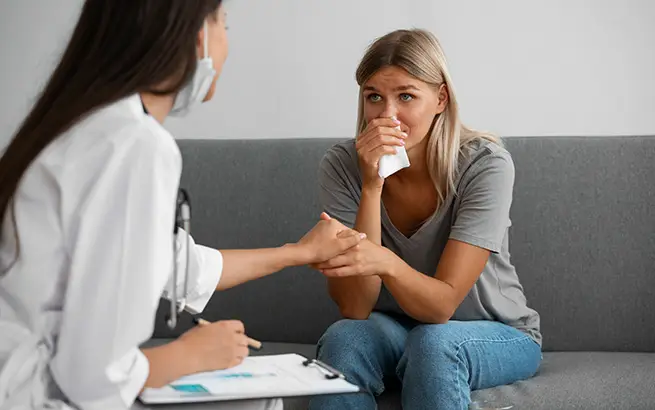In today’s blog discussion, the topic is how can mental health services be improved. And to meet the increasing needs effectively.
The state of mental health is a gauge of how dedicated society is to care for its members.
Definition of mental health

Mental health affects our emotional, psychological, and social interactions as well. It is necessary to achieve personal success and community growth.
It is important to understand its components that help in addressing its needs effectively.
Mental Health Issues

When we talk about mental health issues, we see different kinds of issues, like those given below.
1: Anxiety Disorders
The most common mental health condition is anxiety disorder. It affects millions of people globally.
Symptoms of anxiety disorder are continuous nervousness, sweating, fast heartbeat, and trembling.
These symptoms of anxiety disorder can affect daily life functioning and relationships. With the help of psychotherapy and medications, we can prevent anxiety disorders.
2: Depression
Depression is a common mental health disorder that involves continuous sadness, and a lack of interest in any kind of daily life activity.
The cause of depression is complex, it involves genetic, biological, and sometimes psychological issues.
With lifestyle adjustments such as regular physical activity and a healthy diet, we can overcome this.
3: Bipolar Disorder
Bipolar disorder includes different kinds of mood swings, emotional highs, and lows. When we want to manage bipolar disorder, we require a combination of medications and psychotherapy.
4: Schizophrenia
Schizophrenia is a serious mental disorder where individuals have abnormal interpretations of reality. As a result of this, a combination of hallucinations, delusions, and extremely disordered thinking and behavior.
How can Mental Services Be Improved?

Mental health has no single indicator. We may speak, about how we feel and how well we are doing in daily life. Good mental health doesn’t mean you always look happy.
Let’s have a look at some tips for how mental health services be improved.
Increase Accessibility
Make sure that mental health services are covered under public and private insurance to make them accessible to a greater number of people.
Incorporate telehealth options to reach each person in remote or underserved regions, making mental health care more accessible to those who wouldn’t otherwise be able to receive it.
Improve quality of Life
Provide education on mental health and training sessions to stay updated with the latest practices and technologies.
Promote Proper care
Integrate mental health care with other types of health care services, such as primary care, to guarantee the best approach to patient health.
This can help in the early detection and management of mental health issues.
Focus on safeguarding and early assistance
Increase awareness about mental health through public education programs that encourage early recognition of symptoms and seeking help.
Improve patient Engagement
Educate patients about their conditions and treatment options to empower them in their care.
And establish systems for patients to provide feedback on their experiences and suggestions for improving services.
Utilize technology and innovation
Use technological tools such as mobile apps, online therapy platforms, and electronic health records to improve the efficiency of service delivery and patient monitoring.
Innovative Practices in Mental Health Care

Here are some innovative practices in mental health care.
Digital Interventions:
Apps that offer cognitive-behavioral therapy (CBT) techniques, mood tracking, and stress management exercises to help users manage their mental health daily.
Utilized in exposure therapy, VR helps treat conditions like PTSD by safely exposing patients to their trauma triggers in a controlled, virtual environment.
Telepsychiatry:
Enables patients to receive psychiatric consultations via video calls, significantly expanding access to mental health care for those in remote or underserved areas.
Use of telehealth platforms for regular monitoring of patients with chronic conditions, allowing for timely adjustments in treatment plans.
Online Therapy Platforms
Online platforms that connect patients with therapists at any time, providing flexibility and immediate access to help when needed.
Offers a degree of privacy, which can encourage more individuals to seek help without worry about being judged.
E-Mental Health Tools
Programs that provide psychological support through guided self-help and therapy-based exercises without the need for direct clinician involvement.
AI-driven tools that analyze provided data on symptoms and provide recommendations or alerts to healthcare providers.
Wearable Technology:
Wearables that monitor physical activity and sleep patterns, provide data that can be important in diagnosing and managing mental health conditions like depression and anxiety.
Integrative Treatment Approaches
Incorporation of best practices like mindfulness, yoga, and meditation into traditional treatment plans to support overall mental wellness.
Focus on diet and nutrition as important components in treating mental health disorders, emphasizing how nutritional changes can affect mental well-being.
Big Data and Predictive Analytics:
Using large datasets to predict mental health trends and outcomes, helping in early intervention and personalized treatment strategies.
What Kind of Mental Health Services does FMRC provide?

FMRC primary care Goldsboro NC, offers a comprehensive array of mental health services designed to address a wide range of conditions through personalized care.
Initial evaluations and diagnostic services form the foundation, enabling accurate assessments and tailored treatment plans for conditions such as depression, anxiety, PTSD, and bipolar disorder.
Specialized therapeutic approaches, including
- Cognitive Behavioral Therapy (CBT)
- Dialectical Behavior Therapy (DBT)
are complemented by group therapy sessions, enhancing both individual and communal healing processes.
Additionally, FMRC provides psychiatric medication management, ensuring optimal outcomes through careful monitoring and adjustments by experienced psychiatrists.
Beyond traditional therapies, FMRC embraces modern solutions like telepsychiatry, which allows patients to access care remotely, increasing convenience and adherence to treatment plans.
The Goldsboro NC also addresses urgent mental health needs with 24/7 emergency support and crisis intervention services, important for acute mental health crises.
Preventative services and community outreach, such as wellness workshops and public education initiatives, play a vital role in promoting mental health awareness and reducing stigma in the community.
Through this kind of integrated services, FMRC is committed to supporting the mental health and well-being of individuals across all stages of treatment and recovery.
Conclusion
The need for the best, responsive, and inclusive mental health services is urgent. As awareness of mental health issues increases, collective efforts enhance our care systems.
we can ensure mental health is a key component of public health, promoting well-being and resilience across communities.
FAQ’s
What are some effective ways to improve mental health services?
Effective ways to enhance mental health services include expanding access via telehealth, improving care quality through continuous professional training, and integrating mental health with primary healthcare.
Where are FMRC mental health services clinics Located?
FMRC operates several mental health clinics, like Goldsboro NC, Cary, Morehead City NC, and Knightdale NC.
How can telehealth contribute to better mental health services?
Telehealth expands access to mental health services, allowing individuals in remote or underserved areas to receive timely care, including therapy and medication management, without the need for travel.















